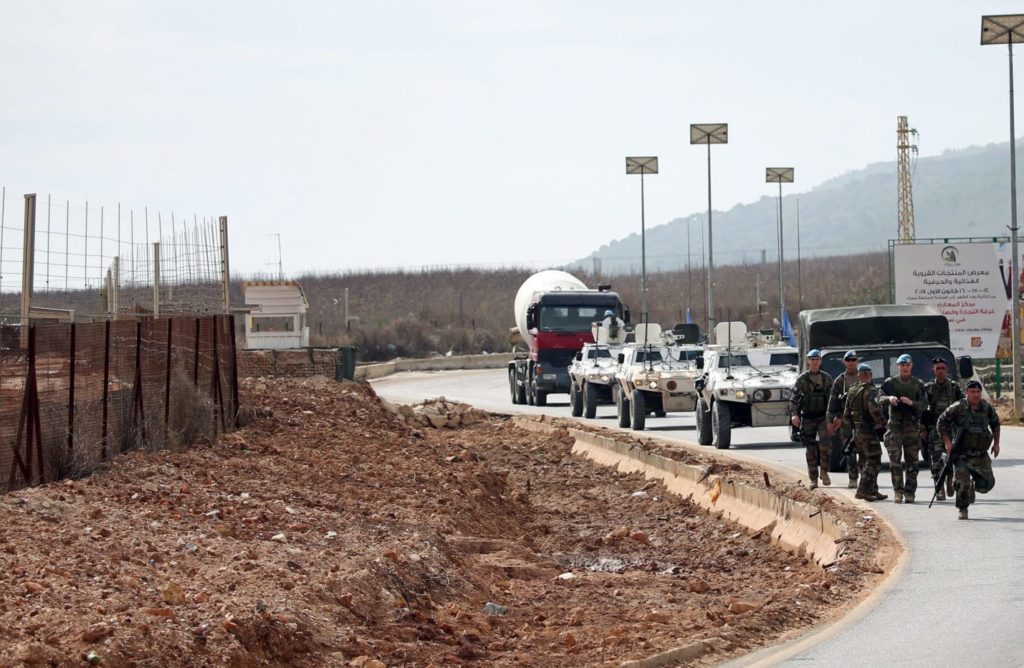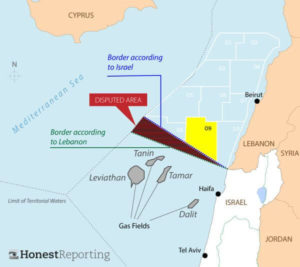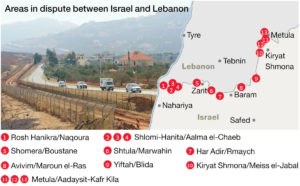FRESH AIR
Will Lebanon’s crisis lead to Lebanese-Israeli border disputes finally being resolved?
August 14, 2020 | Jack Gross

In wake of the massive explosion in Beirut, resulting in more than 200 deaths, and subsequent outpouring of public frustration with deteriorating living conditions in Lebanon, the main sides blocking a resolution to maritime border disputes between Israel and Lebanon have agreed to American mediation, according to high-ranking Lebanese officials and diplomats.
The US has been involved in attempting to mediate the dispute since 2011, but Hezbollah, which holds a powerful position in Lebanese politics, has always viewed Washington’s involvement as biased towards Israel. The maritime border dispute has become a priority for US Secretary of Political Affairs David Hale and his team during his trip to Beirut, leading to speculation these issues may finally be on the verge of resolution.
Lebanon and Israel are still technically at war and their territorial disputes stem back to the 1948 Arab-Israeli war. There are two separate border disputes: land and maritime.
Maritime Disputes
Both Lebanese President Michael Aoun and long-time Lebanese MP and chief border negotiator Nabih Berri have expressed willingness to put an end to the decades-old maritime border disputes. The contested territory is an 860 square kilometer triangle of water located in the eastern Mediterranean Sea. The disagreement over it stems from a dispute regarding the demarcation method for the maritime boundary: Israel marks the border as being at a 90-degree angle to the coastline while Lebanon marks it as a continuation of the land borderline.
This disputed area has gained much more significance since 2009 when major natural gas reservoirs were discovered in the sea between Israel and Cyprus. It is anticipated that the disputed area contains natural gas reserves as well. Overall, it is believed that Lebanon’s territorial waters could possibly hold up to 25 trillion cubic feet according to seismic studies, which could be critical for Lebanon’s devastated economy. Resolving the dispute would make it much easier to exploit these resources.
Israel’s current exclusive economic zone (EEZ) is 22,000 square kilometres and stretches 130km from the northernmost tip of Israel’s Mediterranean shoreline and 204km from the southernmost tip of Israel’s Mediterranean shoreline. Important international shipping lanes run through Israel’s EEZ , and it contains several recently developed natural gas fields. Jerusalem would also benefit from having the maritime dispute resolved as it seeks to expand gas exploitation and also explore new ways to export its existing gas resources.
In 2018, Lebanon invited tenders for the exploration of several blocs of its offshore waters for energy resources. A combined venture by Total, ENI, and Novatek purchased rights to explore Block 9, which contains part of the disputed zone. They were set to begin exploration this year.

The maritime dispute gained importance when nearby natural gas fields were discovered (Credit: Honest Reporting).
When it comes to negotiations between Israel and Lebanon over the maritime border, some progress has been made in recent years. Lebanon finally accepted Washington as a mediator in negotiations, despite pushback from Hezbollah. In the 2011-2012 negotiations, Israel made a number of concessions to Beirut, accepting a US-proposed compromise boundary line which would have given Lebanon 55% of the disputed area.
Lebanese negotiations have been led by Berri. Berri is a close ally of Hezbollah and is the leader of the Shii’ite Amal Movement. Hezbollah granted Berri its blessing to lead negotiations because Hezbollah’s leaders knew he would never cross the party’s red lines. Last week, Berri told a Lebanese newspaper that negotiations “with the Americans are almost finished.” The same report indicated that Hezbollah has entrusted Berri with making a final decision and also noted that Hezbollah has been “the primary opponent of reaching a deal.”
Last week, French President Emmanuel Macron, who has been in Beirut assisting with humanitarian efforts, began assembling the major political actors in Lebanon to create a unity government in Lebanon.
This may prove more difficult for the Lebanese side given that the country’s government resigned on Monday after domestic protests over corruption and poor living standards. The Lebanese governing cabinet quit, but with ministers still serving in a caretaker capacity Macron can perhaps still persuade Lebanon to bring an end to issues they have spent decades avoiding, such as the territory dispute with Israel.
Last Thursday, during a phone call with US President Donald Trump, President Aoun noted that he hopes to bring an end to the border disputes with Israel with the help of US mediation.
Land Borders

The 13 areas in dispute between Israel and Lebanon (Credit: Gil Eliyahu).
The UN Peacekeeping forces in the South of Lebanon (UNIFIL) have also continually worked to reach an agreement on the Israel-Lebanon land border, which is separated by the ”Blue Line” – which in turn is based on the Israel-Lebanon Armistice Agreement of 1949 and the earlier Franco-British Agreement on Mandatory Borders from 1920.
Lebanon disputes 13 points along its southern border with Israel as delineated by UNIFIL in 2000-1, following Israel’s withdrawal from all Lebanese territory. The largest and best known of these is the Shebaa farms area, which Israel captured from Syria in the 1967 war, and is therefore considered part of the Golan Heights, though Lebanon continues to claim it as Lebanese territory.
It is unclear if a maritime border agreement would also lead to progress on the land border, but this is unlikely. Hezbollah has always had a stake in maintaining the land border dispute as a justification for perpetuating the conflict with Israel and would be unlikely to allow Lebanon to relinquish that justification unless its back was truly to the wall.
Why now?
Hezbollah has always been the biggest obstacle to reaching a settlement with Israel. After an increase in protests against the corruption of the ruling elite, “Hezbollah has thrown in the towel” on the maritime border dispute, a senior Arab diplomat in Beirut told Al Arabiya earlier this month, and is now open to resolving the conflict.
These new talks come just days after the explosion on August 4 at the port in Beirut left more than 200 people dead, thousands injured and devastated large segments of city. Since then, the political landscape in Lebanon has changed.
In response to the explosions and the destruction, many Lebanese demonstrators took the streets to protest the corruption and negligence of the ruling elite. Many consider the blast the latest example of a long tradition of incompetent governance and disregard for the public’s welfare and safety by the country’s elite.
Protestors have stormed government ministries and called for the resignation of legislators. “Terrorists, terrorists! Hezbollah are terrorists!” many have chanted.
This is not the first round of demonstrations in Lebanon in recent months. Large-scale anti-government protests emerged in 2019 in response to poor economic conditions.
Since then, the economic crisis in Lebanon, exacerbated by the COVID-19 pandemic, has caused the Lebanese pound to collapse and prices to soar. Many cannot afford basic staples as the cost of living, unemployment levels and poverty rates are at all-time highs.
While previous US-mediated talks between Lebanon and Israel have led to no resolution, the current situation on the ground may finally lead to an end to the border disputes. Energy discoveries would be critical to support the crippled Lebanese economy, but would have trouble moving ahead as long as the maritime boundary is disputed. While common sense and goodwill has been in short supply in Lebanon’s approach to this issue, and in Lebanese politics more generally, perhaps the time is finally now ripe for a commonsense settlement along the lines previously suggested by the US to prevail.
RELATED ARTICLES

US Middle East strategy amid regional instability: Dana Stroul at the Sydney Institute






















